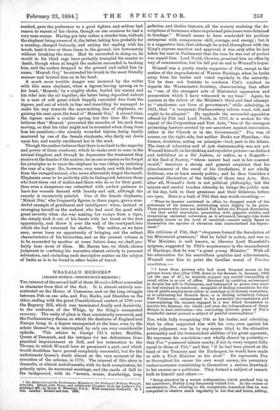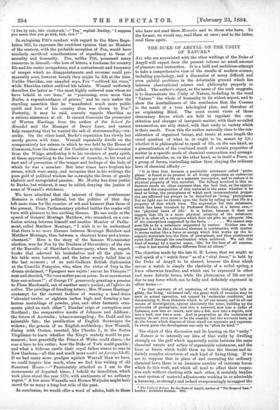WRAXA.LL'S MEMOIRS.*
[SECOND NOTICIL—POSTHITMOUS MEMOIRS.] THE interest of the second half of these Memoirs differs somewhat in character from that of the first. It is almost entirely con- centrated on the House of Commons, and on the long struggle between Pitt on one side, and Fox, Burke, and Sheridan on the other, ending with the great Constitutional contest of 1789 over the Regency Bill, which was terminated finally and decisively, to the confusion of the Whigs, by the King's unexpected recovery. The unity of place is thus consistently preserved, and the Parliamentary drama on which the destinies of England and Europe hung to a degree unsuspected at the time, even by the actors themsel:es, is interrupted by only one very considerable episode. This relates to George lit.'s sister, Matilda, Queen of Denmark, and the intrigue for her deliverance from practical imprisonment at Zell, and her restoration to the Throne, in which Wraxall bore SO prominent a part, and which would doubtless have proved completely successful, but for the unfortunate Queen's death almost at the very moment of the execution of the .scheme, in 1775. The interest of this story is dramatic, or almost melodramatic, with its dark conspirators, its princely spies, its nocturnal meetings, and the castle of Zell in the background, with its "towers, moats, drawbridge, long The Historical and the Posthumous Memoirs of Sir Nathaniel William Wranall, 1172-1785. Edited, with Notes, and Additional Chapters from the Author's Un- published MS., by Henry B. Wheatley, F.S.A. With numerous Portraits. In 5 vols. London : Bicker's and Son. 18814
galleries, and Gothic features, all the scenery realising the de- scriptions of fortresses where imprisoned princesses were detained in bondage." Wraxall seems to have conducted his perilous enterprise with conspicuous skill, courage, and energy ; but it is a suggestive fact, that although he acted throughout with the King's express sanction and approval, it was only after he had taken his seat in Parliament that the sum he was out of pocket was repaid him. Lord North, likewise, promised him an office by way of remuneration, but his fall put an end to Wraxall's hopes.
Wraxall was a pretty steady supporter of Pitt, except in the matter of the impeachment of Warren Hastings, when he broke away from his leader and voted regularly in the minority. Yet he does not hesitate to condemn Pitt's conduct as regards the Westminster Scrutiny, characterising that affair as "one of the strongest acts of Ministerial oppression and persecution which I have witnessed in my time." Again, he rejoices at the defeat of the Minister's third and final attempt to "ameliorate our form of government," while admitting, in 1821, that "a temperate Parliamentary reform must, will, and ought to he adopted." He applauds the successful opposition offered by Pitt and Lord North, in 1787, to a motion for the repeal of the Corporation and Test Acts, "two of the strongest protecting barriers erected by our ancestors against innovation, either in the Church or in the Government." Fox was, of course, on the right side, but neither Burke nor Sheridan,—the former, doubtless, acting on principle—took part in the debate. The time of toleration and of just statesmanship was not yet. Wraxall himself, in his striking and repulsive picture—as distinct and individual as a Sir Joshua, or rather, as a Hogarth- of the Earl of Surrey, "whom nature had cast in her coarsest mould," mentions a strong and general suspicion that his abandonment of the creed of his forefathers, if not wholly fictitious, was at least merely politic ; and he thus furnishes a practical illustration of the futility of those very Acts. But, after all, Wrairall's forte is not political philosophy, but the minute and careful touches whereby he brings the public men of his day, both in their greatness and their littleness, before our eyes. Here is a trait of Pitt that was worth recording :— "When he became confirmed in office, he dropped much of the sullenness of his manner, substituting more dignity in its place. Those persons who have not beheld Pitt before the French Revolution —for that awful convulsion, proceeding with gigantic strides, and threatening universal subversion as it advanced, brought him down gradually nearer to the level of mankind—cannot easily figure to themselves the species of elevation that characterised his deport- ment."
His criticism of Pitt, that "eloquence formed the foundation of his Ministerial greatness," that he failed in action, and was no War Minister, is well known, as likewise Lord Mansfield's epigram, suggested by Pitt's acquiescence in the impeachment of Hastings, that he was "a great young Minister." With all his admiration for his marvellous qualities and achievements, Wraxall uses him to point the familiar moral of Vanitas vanitatum :— "I know from persons who had most frequent access to his private hours, that after 1793, down to his decease in January, 1806 [at the age of 47], he scarcely enjoyed any settled tranquillity of mind, either in or out of office. Devoured by ambition, accustomed to dictate his will to Parliament, and habituated to power ever since he had attained to manhood ; incapable of finding consolation for the lose of public employment either in marriage or in literary researches, or in cultivating his Kentish farm, or in drilling refractory Cinque Port Volunteers ; embarrassed in his pecuniary circumstances, and contemplating his country engaged in a war which threatened to involve the finances, the credit, and even the independence of Great Britain in final subversion—the concluding thirteen years of Pitt's 'wonderful career present a subject of painful contemplation."
Nor, while fully recognising Pitt as his leader, and admitting that he often supported him with his vote, even against his better judgment, was he by any means blind to the attractive personality and the transcendent abilities of his great opponent, He expresses his conviction—not wholly shared by posterity— that Fox "possessed talents nearly, if not in every respect fully equal to those of Pitt," and that "if he had been placed at the head of the Treasury and the Exchequer, be would have made as able a First Minister as his rival." He represents Fox as throughout his career his own worst enemy, his pecuniary embarrassments constituting in themselves a serious drawback to his success as a politician. They formed a subject of remark both to himself and others :— " Being attacked by a severe indisposition which confined him to his apartment, Dudley Long frequently visited him. In the course of conversation, Fox alluding to his complaints, remarked that he was compelled to observe much regularity in his diet and hours, adding,
'I live by rule, like clockwork.'—' Yes,' replied Dudley, I suppose you mean that you go tick, tick, tick ?' "
In eulogising Pitt's conduct with regard to the Slave Regu- lation Bill, he expresses the confident opinion that no Minister of the century, with the probable exception of Fox, would have similarly sacrfficed considerations of expediency to those of morality and humanity. Fox, unlike Pitt, possessed many resources in himself,—the love of letters, a fondness for country life and for rustic occupations, and a contentment and buoyancy of temper which no disappointments and reverses could per- manently sour, however keenly they might be felt at the time. Unlike Sheridan, our annalist says, Fox "outlived his vices," -while Sheridan rather outlived his talents. Wraxall uniformly describes the latter as "the most highly endowed man whom we have beheld in our time," as "possessing, even more than Burke, a superabundance of genius," and he once makes the startling assertion that he "manifested much more public spirit and love of his country than was shown by Fox." Posterity, it may be said, scarcely regards Sheridan as a serious statesman at all. It cannot dissociate the prosecutor of Warren Hastings from the author of the School for Scandal and the Manager of Drury Lane. and cannot help suspecting that he wanted the salt of statesmanship,—sin- cerity. On the other hand, Burke's reputation has slowly but surely grown with time. Wraxall repeatedly dwells on the comparatively low esteem in which he was held by the House of -Commons, from the time of the Coalition to that of his secession from the Whigs, attributing it to his virulence of party spirit, at times approaching to the borders of insanity, to his want of tact and of perception of the temper and feelings of the body of which he was a member. But later times have forgiven his errors, which were many, and recognise that in his writings the pure gold of political wisdom far outweighs the dross of gaudy rhetoric and unregulated passion. Mr. Morley has done justice to Burke, but without, it may be added, denying the justice of some of Wraxall's strictures.
We have admitted that the interest of these posthumous Memoirs is chiefly political, but the politics of that day left more time for the exercise of wit and humour than those of the present. From Parliamentary pitched battles the reader will turn with pleasure to less exciting themes. He can smile at the speech of General Montagu Matthew, who remarked, on a con- fusion arising between himself and another Member of Parlia- ment, called. Matthew Montagu, "I wish it to be understood that there is no more likeness between Montagu Matthew and Matthew Montagu, than between a chestnut horse and a horse- chestnut." Here is the story of the famous Westminster election, won for Fox by the Duchess of Devonshire ; of the rise of the Barrens; of Sheridan's dinner-party, where the superb books that adorned his bookshelves and all the plate on his table were borrowed, and the latter nearly failed him at the last moment ; of an anti-Galilean British diplomatist at the Com6die Francaise, who, when the victor of Ivry in the drama exclaimed, " Epargnez mes snjets ! sauvez lea Francais !" rose and shouted, "Ne vous mettez pas en peine ils se sanvstoront bien eux-mames !"; of George IV. generously granting a pension to Flora Macdonald, out of another man's pocket; of rafaire du collier. The privilege of franking letters ; Mrs. Warren Hastings' contempt for the current fashion of wearing a head-dress "elevated twelve or eighteen inches high, and forming a bar- barous assemblage of powder, pins, and other fantastic orna- ments piled on each other "; Dundas' reign of corruption over
• Scotland ; the comparative merits of Johnson and Addison ; the future of Australia ; tobacco-smuggling; Dr. Dodd and his miserable fate; the predilection of English Sovereigns for widows ; the genesis of an English archbishop ; how Wraxall, dining with Ossian, resorted, like Charles I., to the Sortes Virgilianw to learn whether the King's malady would be per- manent ; how gracefully the Prince of Wales could shave,—he was a hero to his cutler; how the Duke of York could gamble ; and what a hideous castle their royal father strove to rear in Kew Gardens,—all this and much more nostri est farrago If we had many more grudges against Wraxall than we have, we could forgive him much, when we find him writing of old Somerset House :—" Passionately attached as I am to the monuments of departed times, I beheld its demolition, which took place about the year 1776, with sentiments of no ordinary regret." A few more Wraxalls and Horace Walpoles might have saved for us many a long-lost relic of the past.
In conclusion, we would offer a word of advice, both to those
who have not read these Memoirs and to those who have. To the former, we would say, read them at once; and to the latter, read them again.



































 Previous page
Previous page